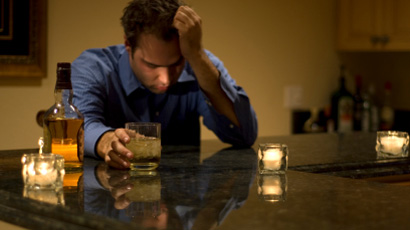Whether you drink in social gatherings only or you call yourself a regular drinker, there will be times when you ask yourself why you consumed so much alcohol last night. That happens when you experienceanxiety after drinking, which is different from a normal hangover. This article will explain possible causes of this condition, and provide some measures to help you prevent and deal with it.
What Does Anxiety After Drinking Feel Like?

It is quite common to hear people say that they feel anxious after drinking. Common symptoms of anxiety include feeling of uneasiness, sweaty hands, shortness of breath, heart palpitations, dizziness and nausea. Those feelings can vary according to different people, depending on how long they have been drinking. Hear what others say about how it feels like:
"It started a few months back after a night out drinking with friends. I wake up in the middle of the night with a fast heartbeat. I was feeling really irritated in the morning. It stayed like this for a couple of days. Sometimes, I even have other symptoms, such as sweaty palms and feeling anxious. It feels like I have knots in my stomach."
"I experience anxiety after heavily binge drinking. The most common issues are sudden headaches, constant dizziness, and heart racing. It feels as if I am going to pass out. The symptoms go away when I stopped drinking for 4-5 days. The problem is that I do not experience any symptoms when I wake up in the morning but the symptoms develop and becomes severe as the day progresses."
Why Do I Have Anxiety After Drinking?
There are many different reasons why people experience anxietyafter drinking. For instance:
- Mood Change: Since alcohol can affect the level of serotonin in the brain, it can change your mood as well. The level of serotonin increases while drinking but comes down quickly after you have finished drinking and that causes feelings of depression and anxiety.
- Drop in Blood Sugar: You may feel anxious, confused, dizzy, nervous, and weak due to a drop in your blood sugar. This often leads to anxiety attacks.
- Dehydration: Alcohol is highly dehydrating and this may cause anxiety-like symptoms such as dizziness, nausea, light-headedness, fatigue, and muscle weakness. On the other hand, excessive drinking can lead to vomiting that may result in severe dehydration. Your body reacts to dehydration by releasing an anti-diuretic hormone that keeps you from urinating. Alcohol affects the process and lowers the levels of anti-diuretic hormone. This makes you urinate more often and deplete your water resources.
- Disrupted Nervous System: Your nervous system is under serious pressure while your body tries to fight off the sedative effects of alcohol. This often puts you in a state of hyperactivity that may lead to sleep deprivation, light sensitivity, and shaking. Many people think a glass of wine after a tough day helps them relax, but that is not the case. Even if it works in the beginning, things become ugly in the long-run mainly because regular drinking interferes with neurotransmitters that make it difficult to deal with anxious feelings. For your brain to function properly there needs to be a right balance of processes and chemicals. Since alcohol is a depressant, it can affect that balance and change the way you think or imagine things, which could lead to anxiety attacks.
How Should I Deal with Anxiety After Drinking?
Exercise
There are other healthy ways to get rid of stress. Meditation and yoga are some great ways to feel better as it makes the left prefrontal cortex of your brain more active. Spending half an hour doing physical exercise will also relieve anxiety by encouraging the release of feel-good hormones. You will also be able to sleep better after exercises.
Aromatherapy
Inhaling certain essential oils may also help change your brain activity and make you feel relaxed. The most effective choices are jasmine, lavender, sandalwood, and rose. You can have a warm bath before going to bed and make it even better by inhaling lavender oil. You can also carry a small bottle of your favorite essential oil and inhale the scent whenever you need to calm your nerves.
Practice Deep Breathing
Learning how to breathe properly will help a lot in reducing anxiety after drinking. Slow, deep breaths help restore your body's rhythms. Simply seta timer on your cell phone and make it vibrate every 3 hours. When it does, take a break from your work and take five deep, relaxing breathes. Inhale though the nose and exhale through your mouth with a sigh for better effects.
Stress Session
Set aside 15 minutes for "time to worry". Whenever you start to feel anxious and worry about something, remind yourself that you will take care of it during your "stress session".
In addition, you can also take a step ahead and prevent anxiety after drinking from happening by:
Change Your Attitude
If you are looking for a way to prevent anxiety after drinking,you should start by adjusting your attitude towards drinking. You should not drink just because you think it helps relieve stress.
Cut Back on Drinking
The other important thing is to cut back on drinking. While it is not easy to keepdrinking less or not drinking at all for a few days, you need to push yourself hard to feel normal again. Set a predetermined limit and never exceed that no matter what. You should also drink water while drinking alcohol – a cup of alcohol followed by a cup of water will keep you from feeling dehydrated.
